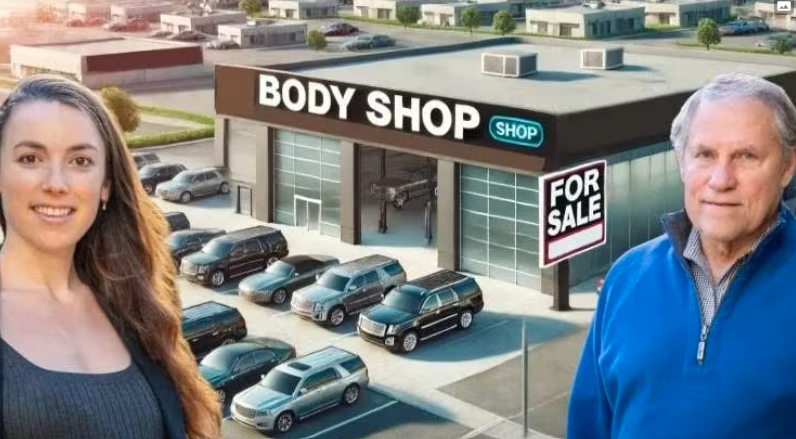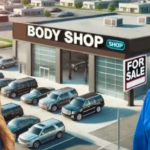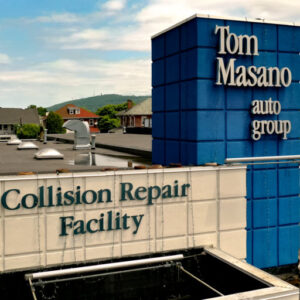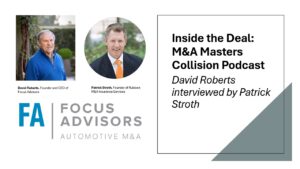Auto dealers are consolidating for many of the same reasons as collision repairers: retiring owners, scale economies, increased competition, higher operating costs, increased vehicle complexity, and new required investments in equipment and facilities. These pressures on dealer body shops create growth opportunities for independent multi-shop operators (MSOs) to expand by acquiring dealer shops and establishing strong referral relationships with dealers.
How Collision Repair Consolidation Impacts Dealer Shops
Access to Repairable Vehicles: Access to repairable vehicles is increasingly controlled by the six largest insurance companies through their Direct Repair Programs (DRPs). Few dealer shops are part of these networks, so insureds often choose a DRP shop rather than the dealer. Insurers also recognize that the average cost of repairs for similar vehicles is often higher when performed by dealers. As a result, they try to keep repairable vehicles within their networks, where they have more control.
Scale Efficiencies Are the Difference: According to the National Automobile Dealers Association and The Romans Group, there are more than 5,500 dealer-owned body shops generating over $6 billion in total revenues. The large consolidators plus the 200 largest independent MSOs total more than 5,000 shops with total revenues of more than $18 billion. This represents roughly the same number of shops as dealers but with three times the revenue! Dealer shops typically have an average shop size of 6,000 sq ft with $1.25M in revenue. In contrast, scaled shops have an average shop size of 12,000 sq ft with $3.85M in revenue. With greater access to repairable vehicles, larger-scale facilities have lower overhead costs, higher retention of technicians, larger parts and paint discounts, and more experienced management teams. With increased scale come higher EBITDA margins. Focus Advisors M&A estimates that consolidator and independent MSO EBITDA margins are more than double those of dealer body shop margins. As the power of large-scale shops grows, dealer shops are at an increasing disadvantage.
Challenges for Dealer-Owned Collision Shops: Few dealers can operate as effectively as an MSO. Most have just one shop. Within the dealership organization, there are often misaligned incentives, with a focus on selling new and used cars and generating recurring service revenue rather than repairing damaged vehicles. Dealer-owned shops face multiple challenges. Meeting the evolving demands of insurers can be difficult for individual dealer shops, leading to operational inefficiencies. High technician turnover rates can disrupt the continuity of operations, while the ongoing need for investment in new technologies and staff training places additional financial strain on the business.
An Opening for MSOs to Buy Dealer Shops: Many MSOs already have referral relationships with single or multi-location dealers. They have multiple purchasing relationships and some calibration relationships. Many are already sponsored for certifications by dealers, even when the dealer has its own shop. For dealers who have questioned why they still run their own body shop, many may be open to selling and establishing a mutually beneficial relationship with an MSO they already know and trust.
What a Dealer is Looking for in a Sale: If an MSO is approaching a dealer about acquiring the dealer’s shop, it’s important to recognize the dealer’s goals. For many dealers, selling their collision shops can provide significant benefits, either by selling the shop real estate or by entering into a market-rate lease for the premises. Partnering with larger operators can lead to improved cycle times and enhanced customer satisfaction. From a financial perspective, selling can unlock capital and generate rental income, offering both stability and opportunities for future growth. This strategic move can streamline operations and provide a foundation for expanding other areas of the business.
Fair Price for Fair Value: A dealer interested in selling is usually looking to get a fair price for the business and assets. Determining the actual true revenues and margins of a dealer shop isn’t straightforward because of the unique ways that dealers sell parts to their own shops and the methods in which operating costs are allocated among the various functions of the dealership. There are different ways to value the dealer’s shop—from market value of the assets to a multiple of the EBITDA to a combination of assets, EBITDA, and future commitments for parts purchase and rent.
A Continuing Referral Relationship: Many dealers are frustrated with their uneven flows of collision work. When they are jammed with work, they either have to disappoint customers with lengthy repair times or refer the work to nearby shops that have capacity. When the dealer is starved for work, he loses technicians because he can’t provide them with enough hours. An MSO buyer can balance the workload among its shops, allowing the dealer to refer all collision work to the MSO buyer with greater confidence and more predictable repair times.
Exclusive or Priority Parts Purchasing: The dealer wants the buyer to continue purchasing parts from their wholesale operation. The MSO that is growing by adding DRPs and additional locations can offer the dealer an opportunity to sell significantly more parts. At the same time, the MSO should take the opportunity to ask for further parts discounts based on increases in purchase volume.
Continued Certification of Technicians and Equipment: The MSO acquirer wants the dealer’s sponsorship for OE certifications. This means the acquirer makes ongoing commitments to training, equipment, and servicing the dealer’s non-collision-related calibrations.
Real Estate Considerations: When selling a collision repair shop, real estate considerations can be crucial. An acquirer may be looking to own the real estate. Most MSOs prefer long-term leases instead of owning because it preserves their capital for further expansion. Most MSOs are willing to enter into market-rate lease terms that offer operational flexibility. Leasing to a “credit tenant” can significantly enhance property value for the seller.
More Dealers are Considering Selling Just Their Shops: Practically every dealer in America is being contacted by dealer brokers, eager to tell them their value and then represent them in a sale. The value of the dealer’s body shop is seldom a key factor in the transaction. Some dealers have decided to sell only their body shops, realizing the benefits of immediate capital gains, ongoing rental income, and reduced complexity in their operations. In a notable transaction in 2023, the Vinart Dealerships in the Lehigh Valley of PA sold a large shop to a well-capitalized consolidator. Focus Advisors M&A, an investment bank specializing in representing collision repairers, represented Vinart and found multiple bidders interested in the large but underperforming facility. The dealership gained a credit tenant and improved parts sales, as well as faster cycle times for repairs. Similarly, in another transaction, Focus helped facilitate the private sale of three large body shops to a regional MSO. This led to over a 50% increase in parts sales and substantial lease income generation, allowing the seller to focus on core operations and pursue future growth opportunities.
What to Know: In a rapidly changing dealership environment, selling a dealer body shop presents compelling advantages, including operational efficiencies, financial rewards, and new
growth avenues.
For MSOs, buying dealer shops is another growth strategy offering long-term benefits, stability, and connections to strong dealerships and OE certifications.
For a more in-depth look at the current state of the dealer collision shop world, check out
the July 2024 Special Report from Dealer’s Edge.
This article by David Roberts was originally published in Fender Bender on September 8th, 2024 linked here.
About Focus Advisors, Inc.
Focus Advisors (www.focusadvisors.com) is the collision industry’s leading M&A advisory firm, partnering with MSOs between $10-100M in annual revenue, helping owners achieve maximum value through strategic growth and exits. Unlike traditional business brokers or large investment banks, Focus Advisors specializes exclusively in collision repair — giving owners unparalleled insight into value, interest, and opportunity timing. With over 25 years in the industry, Managing Director David Roberts has led more than 40 transactions totaling over $500 million in transaction value and more than 325 collision repair shops, including Pride Auto Body, Quanz Auto Body, Mills Body Shops, and Master Collision Group.
Investment Banking Services and Securities offered through Independent Investment Bankers Corp, a broker-dealer, member FINRA, SIPC. Focus Advisors Automotive M&A is not affiliated with Independent Investment Bankers Corp.
Interested in learning more? Read Auto Dealers, Is It Time to Sell Your Body Shop?






